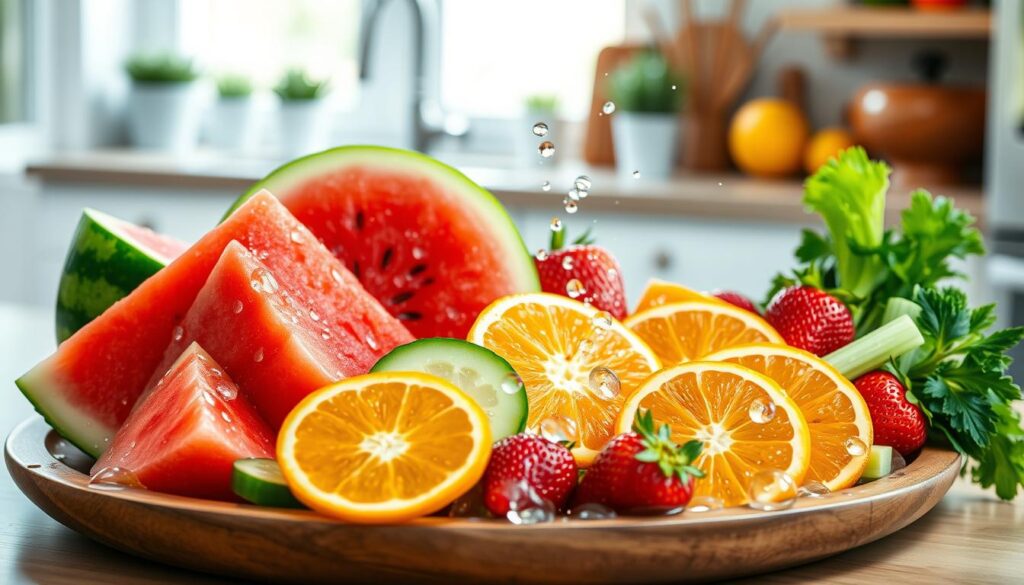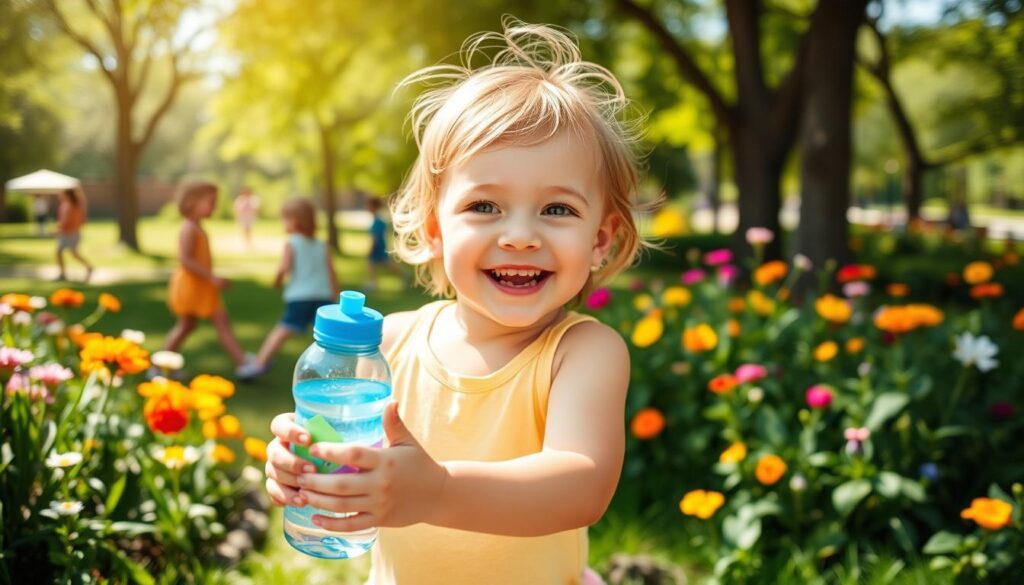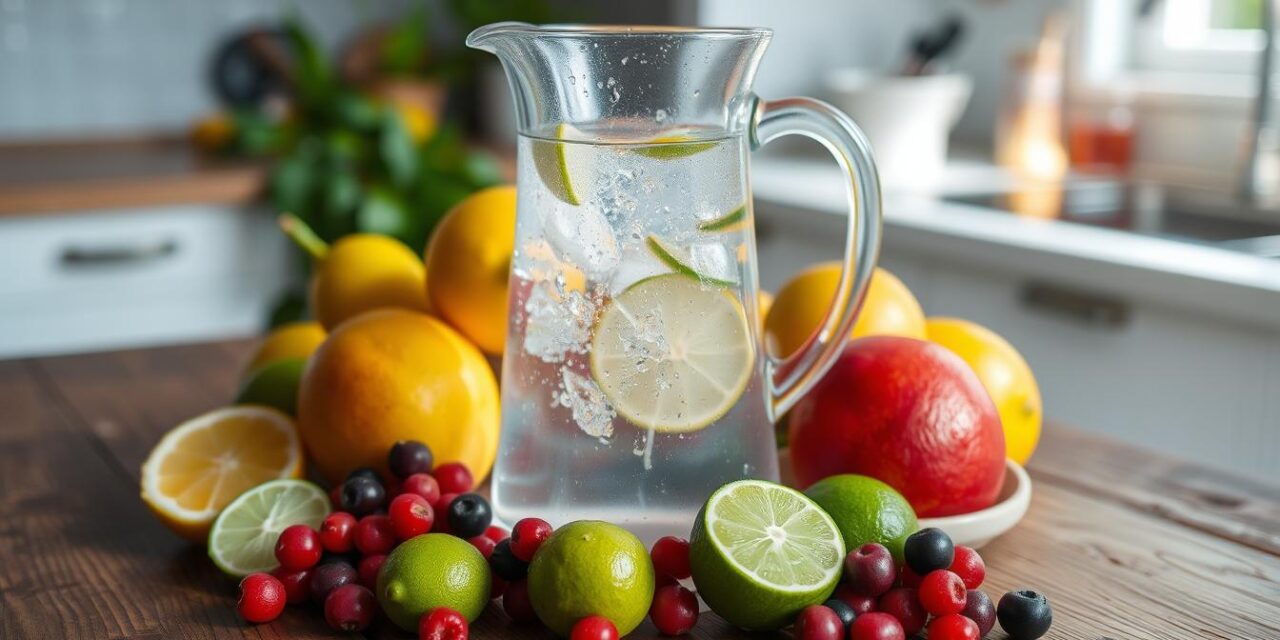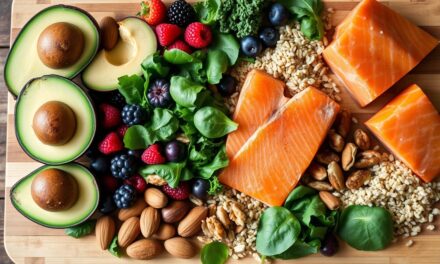Did you know over 60% of our bodies are water? Drinking enough water is key to our health, but many Aussies find it hard. This guide will help you stay hydrated and enjoy Australia’s varied climate.
Key Takeaways
- Water makes up more than 60% of our bodies and is vital for health
- Not drinking enough water can cause tiredness, headaches, and brain fog
- Learn how to stay hydrated with tips for Australia’s climate and active lives
- Find ways to track your water intake and set goals that fit you
- Discover how much water you need based on your age and activity level
Understanding the Vital Role of Water in Human Health
Water is key to life, crucial for our health and well-being. It supports many body functions, like keeping us cool and moving nutrients around. Knowing how much water we need and how to stay hydrated is vital for our cellular health and wellness.
How Water Supports Body Functions
Water helps keep our body temperature stable and protects our joints. It also carries nutrients and oxygen to our cells and helps remove waste. Drinking enough water is essential for our organs, muscles, and tissues to work well, keeping us healthy at the cellular level.
Signs of Proper Hydration
- Clear or light-yellow urine
- Infrequent urination (every 2-4 hours)
- Moist and supple skin
- Minimal thirst and fatigue
The Science Behind Daily Water Needs
The amount of water we need varies based on our age, gender, activity level, and where we live. Adults should drink 8-10 cups (2-2.5 liters) of water daily for good hydration and health. But, those who are more active, live in hot places, or have health issues might need more.
“Staying hydrated is essential for maintaining optimal body functions and overall well-being. Understanding the science behind our daily water needs can help Australians make informed choices to support their cellular health.”
Hydration Tips for Active Australians
Australians love staying active, and we know how key sports hydration is for health and performance. Whether cycling, playing sports, or enjoying the beach, drinking enough water is vital. It helps with endurance, keeps electrolytes balanced, and boosts overall wellbeing.
Here are some top tips to keep you hydrated:
- Drink lots of water before you start exercising. This fills up your body’s fluids and gets it ready for the challenge.
- Keep drinking water or electrolyte drinks during your workout. This replaces lost fluids and electrolytes, based on how hard and long you’re working out.
- Drink water or electrolyte drinks after exercising to help your body recover. This helps replace lost fluids and electrolytes, supporting your electrolyte balance.
Remember, how much water you need can change based on the weather, how active you are, and your body’s needs. Listen to your body and adjust your fluid intake to keep up with your endurance activities and stay healthy.
“Proper hydration is not just about drinking water – it’s about replenishing the essential electrolytes your body needs to function at its best.”
By following these tips, you’ll stay healthy, full of energy, and perform at your best. Enjoy your active lifestyle in Australia!
Smart Ways to Track Daily Water Intake
Drinking enough water is key for good health. But, it can be hard to keep track of how much you drink. Luckily, there are many tools and methods to help Australians stay hydrated.
Digital Tracking Apps and Tools
Many people use hydration tracking apps to make it easier. These apps let you log your water intake and remind you to drink more. Apps like WaterMinder, Hydro Coach, and Plant Nanny have features for setting goals and tracking progress.
Visual Monitoring Methods
Some prefer using visual monitoring methods. A marked water bottle or tumbler can help you remember to drink enough. Others use visual cues, like filling a container in the morning and trying to finish it by night.
Setting Hydration Goals
- Find out how much water you need based on your age, activity, and where you live.
- Begin with a goal you can reach and increase it as you get better at drinking water.
- Set specific water intake targets for different times, like when you wake up or before bed.
- Check and change your hydration goals often to match your changing needs and life.
Using both digital and visual methods can help Australians stay on top of their water intake. With a bit of planning and regular effort, drinking enough water is simple.
| App | Key Features | Pricing |
|---|---|---|
| WaterMinder | – Custom daily water goals – Automated reminders – Progress tracking |
Free with in-app purchases |
| Hydro Coach | – Personalized hydration plans – Sync with fitness devices – Extensive reporting |
Free with in-app purchases |
| Plant Nanny | – Gamified hydration experience – Nurture a virtual plant – Motivational notifications |
Free with in-app purchases |
Natural Sources of Hydration Beyond Water
Water is key for staying hydrated, but there are tasty alternatives too. Discover hydrating foods, fruit water content, vegetable hydration, and natural beverages to keep your body hydrated.
Fruits like watermelon, oranges, grapes, and berries are full of water. They make staying hydrated fun and tasty. Vegetables like cucumbers, tomatoes, and leafy greens are also great. They offer nutrients and help you stay hydrated.
- Watermelon: 92% water content
- Oranges: 88% water content
- Grapes: 81% water content
- Cucumbers: 96% water content
- Tomatoes: 94% water content
- Spinach: 93% water content
Try natural beverages like fresh fruit and vegetable juices, and herbal teas. They hydrate you and add nutrients and antioxidants to your diet.
“Staying hydrated is not just about drinking water – it’s about incorporating a variety of hydrating foods and natural beverages into your daily routine.”

By trying different hydrating foods, fruit water content, vegetable hydration, and natural beverages, you can stay hydrated and nourished. Enjoy the variety of hydration options available to you.
Timing Your Water Intake Throughout the Day
Staying hydrated is key for good health. Knowing when to drink water is important. It helps your body all day long.
Morning Hydration Routine
Begin your day with water. Drink a full glass as soon as you wake up. It helps your body wake up and gets your metabolism going. Adding lemon or fruits can make it more enjoyable.
Pre and Post Exercise Hydration
Drink water before and during exercise. It keeps you hydrated. After working out, drink water or electrolyte drinks to help your muscles recover.
Evening Hydration Guidelines
Drink water in the evening to help your body rest. But don’t drink too much before bed. It can mess up your sleep.
Match your water intake with your daily activities. This ensures your body gets the water it needs. It’s good for an active day or a calm night’s sleep.
Common Hydration Mistakes to Avoid
Keeping your body hydrated is key for health and energy. But, it’s easy to make mistakes that can harm your hydration efforts. This section will clear up myths and offer tips to keep you hydrated.
Steer Clear of Overhydration
Drinking enough water is important, but too much can be dangerous. Drinking too much water can mess up your body’s salt levels, causing hyponatremia. This is a serious condition. Watch your water intake, especially when you’re active or it’s hot outside. Signs of too much water include headaches, nausea, and feeling confused.
Rethink Your Reliance on Caffeine and Sugary Drinks
Many people drink coffee and energy drinks to stay hydrated. But, these drinks can actually make you lose more water because they make you pee more. Also, sugary drinks may seem to hydrate you, but their sugar can harm your health. Try to drink more water and other hydrating drinks instead.
Beware of the Dehydrating Effects of Alcohol
It’s tempting to drink alcohol to feel hydrated. But, alcohol makes you pee more and can dehydrate you. If you drink alcohol, make sure to drink water or other hydrating drinks too.
By avoiding these common mistakes, you can keep your body hydrated. This is important for staying healthy, whether you’re active, dealing with heat, or just going about your day.
Special Hydration Needs During Australian Summers
As Australia’s hot and humid summers come, it’s key to know how to stay healthy and safe. The heat and humidity can be tough, so we need special ways to handle it. This includes managing heat stress, staying hydrated, protecting from the sun, and being safe around water.
Managing Heat and Humidity
The Australian summer can really test how well our bodies handle heat. Heat stress is a big worry, and knowing the signs is important. These signs include a lot of sweating, a fast heartbeat, and feeling dizzy. Drinking lots of water and fluids with electrolytes helps replace what we lose through sweat.
Outdoor Activity Considerations
- Adjust the intensity and duration of outdoor activities to avoid heat-related illnesses.
- Wear light, breathable clothing and sun protection to shield from the harsh UV rays.
- Take frequent breaks in shaded areas to allow your body to cool down.
Beach and Pool Safety Tips
- Stay hydrated by sipping water regularly, even if you don’t feel thirsty.
- Reapply sun protection sunscreen every few hours to maintain adequate coverage.
- Be mindful of water safety hazards, such as rip currents and strong waves, and only swim in designated safe areas.
- Supervise children closely and ensure they wear appropriate flotation devices when near water.
By focusing on these hydration and safety tips, Australians can have a great summer. We can enjoy the outdoors while staying safe from the heat and humidity.
Hydration for Different Age Groups and Activities
Keeping hydrated is key for everyone, no matter their age or how active they are. From kids to seniors, and from office workers to those who work outdoors, each group has special hydration needs. These needs are important for staying healthy and feeling good.
Hydration for Children
Children are full of energy and grow fast, so they need lots of water. Experts say kids should drink water all day. It’s also important to make sure they always have access to clean water. Teaching kids to drink water regularly helps them stay healthy for life.
Hydration for Older Adults
As we get older, our bodies need more water. Older adults might not feel thirsty as much, which can lead to dehydration. It’s important to drink plenty of water and eat hydrating foods to stay healthy and sharp in mind.
Hydration for Pregnant Women
Pregnancy is hard on the body, and staying hydrated is crucial for both mom and baby. Pregnant women should drink lots of water and eat foods with lots of water, like fruits and veggies. This helps meet their body’s changing needs.
Hydration in the Workplace
Staying hydrated at work is important for everyone. Office workers should take breaks to drink water, and those who work hard physically need to drink even more. Having clean water available and encouraging everyone to drink can make workers healthier and more productive.
| Age Group | Recommended Daily Fluid Intake |
|---|---|
| Children (4-8 years) | 7-11 cups (1.7-2.6 litres) |
| Adolescents (9-13 years) | 9-14 cups (2.1-3.3 litres) |
| Adults (14-50 years) | 11.5-15.5 cups (2.7-3.7 litres) |
| Older Adults (51+ years) | 9-12 cups (2.1-2.8 litres) |
| Pregnant Women | 11.5-16 cups (2.7-3.8 litres) |
These are general guidelines, and your needs might be different. Things like where you live, how active you are, and your health can affect how much water you need. Talking to a doctor can help make sure you’re drinking enough water.

Conclusion
Hydration is key for keeping the human body in balance. This is especially true for Australians, given their climate and active lifestyle. We’ve looked at how water supports our bodies, how to know if we’re drinking enough, and how to track our water intake.
By focusing on staying hydrated, Australians can protect their health for the long term. Drinking enough water helps control body temperature and moves nutrients around. It also boosts brain function and keeps our systems working well.
Staying hydrated is a simple yet powerful way to improve your health. It’s good for anyone, whether you’re always on the go, work hard, or just want to feel better. Start these hydration tips and see how they can change your life in Australia.





